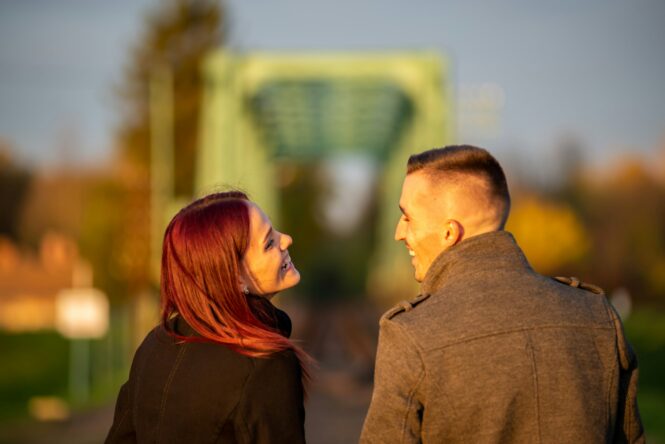Dating an older man comes with all kinds of assumptions—some romantic, some cringey, and a lot that just aren’t based in reality.

Whether it’s about maturity, money, or emotional safety, a lot of women go into these relationships expecting one thing and end up realising it’s way more complicated. While in many ways, age-gap relationships are just like any other romantic partnership, there are some differences that are worth noticing. Here are some of the most common things women often get totally wrong about coupling up with a man who’s older than them.
1. Thinking he’ll automatically be more mature

Age doesn’t equal emotional intelligence. Just because he’s older doesn’t mean he’s processed his childhood wounds or knows how to communicate like an adult. Some older men have simply had more years to perfect avoiding responsibility. Sure, he might know how to act calm in a crisis, but that doesn’t mean he’s great at opening up, apologising properly, or holding space for someone else’s feelings. Maturity has way more to do with self-awareness than birthdays.
2. Assuming he wants to settle down

A lot of women think older men are automatically over the party phase and ready to build a stable life. However, age doesn’t always come with commitment. Some of them are still chasing freedom or avoiding anything that resembles real emotional depth. He might say all the right things, but that doesn’t mean he’s actually looking to lock things down. Some older guys are just better at sounding like they know what they want, even if they don’t.
3. Believing he’ll be more financially secure

Not all older men have their financial life sorted. Some are still paying off debt, living paycheque to paycheque, or recovering from expensive divorces. Age doesn’t automatically mean wealth — or even basic stability. Going in expecting dinners, holidays, and “provider” energy can backfire fast. It’s better to see what his actual lifestyle looks like than assume he’s sitting on a retirement fund just because he’s a few years ahead.
4. Thinking he won’t play games

The stereotype is that older men are “done with games,” but in reality, some just play more subtle ones. They might not ghost or breadcrumb in the same way younger guys do, but emotional unavailability still shows up, just in a more polished package. If he’s vague, avoidant, or makes you feel like you’re asking too much, age doesn’t change that. Being older doesn’t make someone immune to commitment issues. It just means they’ve had more time to hide them better.
5. Expecting him to be less dramatic

People assume older men have fewer emotional highs and lows, but some are just as reactive, petty, or quick to sulk as anyone else. Age might mellow people out a bit, but it doesn’t magically erase personality traits. If he’s been dramatic his whole life, that habit doesn’t vanish with time. In fact, some older guys double down on the drama because they’ve always got away with it and see no reason to change now.
6. Thinking he’ll respect boundaries more

You’d think someone who’s been around longer would understand the importance of boundaries, but not always. Some older men are used to doing things their way and struggle when anyone pushes back. They might see boundaries as a challenge to their authority or interpret them as criticism. And instead of adjusting, they might just try to steamroll over your needs without even realising they’re doing it.
7. Believing he won’t care about appearances

Just because he’s older doesn’t mean he’s above vanity. Some older men are just as into aesthetics, body image, and youthfulness, sometimes even more so if they’re feeling insecure about ageing. He might not be chasing clout, but he could still have a specific “look” he expects from a partner. And yes, that expectation can come with its own pressure, even if it’s not obvious at first.
8. Assuming he’ll be less jealous

People often think jealousy fades with age, but that’s not always true. In fact, some older men get *more* possessive because they’re insecure about younger partners drifting toward someone closer to their own age. Instead of open trust, you might get quiet control—little digs about what you wear, who you talk to, or how much attention you get. It’s not always loud, but it’s still there.
9. Expecting great communication

There’s a big difference between being articulate and being emotionally available. Some older men are excellent talkers—charming, well-spoken, confident—but still completely unable to have a vulnerable conversation. If he dodges hard topics, shuts down, or gets defensive when anything emotional comes up, that’s not wisdom. That’s just another version of emotional avoidance dressed up in adult language.
10. Thinking the age gap won’t matter

At first, it might feel like it doesn’t. After all, you connect, you laugh, you click. However, as time goes on, the difference in references, goals, energy levels, and even expectations can start to feel bigger than you thought. It doesn’t mean the relationship won’t work, but assuming the age gap is “no big deal” often backfires. It can be a big deal, especially when life paths stop lining up.
11. Believing he’s more emotionally stable

Time doesn’t always equal healing. Some older men are carrying unprocessed grief, past relationship trauma, or decades of emotional neglect they’ve never talked about, let alone worked through. If he hasn’t dealt with his past, it’s going to bleed into the present. Emotional stability isn’t about age; it’s about doing the work, and not everyone’s done it just because they’ve had more time.
12. Assuming he knows what he wants

Just because someone’s older doesn’t mean they’ve figured life out. Some men are still winging it at 50, unsure of what they want from a relationship, career, or even their daily routine. Women often expect clarity and direction from older partners — but plenty of men are still drifting, avoiding decisions, or playing things “by ear” well into middle age.
13. Expecting fewer power struggles

You’d think an older partner would be more collaborative, but some are used to being in control. That means your opinions might be dismissed, your input waved off, or your independence subtly undermined. It’s not always obvious or aggressive. Sometimes it shows up as “advice” or “suggestions” that aren’t really optional. If you’re not careful, the power dynamic can tilt before you even realise it’s happening.
14. Thinking he’ll appreciate you more

Some women go into relationships with older men thinking, “He’ll see my value because he’s done chasing superficial stuff.” And maybe he says he does, but not every older guy walks the walk. If he’s still chasing validation or trying to feel younger through your energy, it’s not about appreciating you—it’s about what you represent to him. That doesn’t always feel as great as it sounds.
15. Believing he’ll be more supportive of your goals

Older doesn’t always mean more encouraging. In fact, some older men can be low-key dismissive of your career, ambitions, or passions, especially if they feel threatened by your independence. It’s subtle—a joke here, a raised eyebrow there—but it chips away at your drive. The right person lifts you up, no matter their age. However, assuming he will just because he’s older? That’s a gamble.
16. Assuming he’s “past” the red flags

This one’s the biggest myth. Some women think if a man’s made it to a certain age without major drama, it means he’s healthy and evolved. However, some red flags don’t fade—they just get sneakier with time. He might not be love bombing or shouting, but the manipulative tendencies, emotional distance, or control can still be there, just wrapped in a more charming or calm exterior. Age isn’t a red flag eraser.




